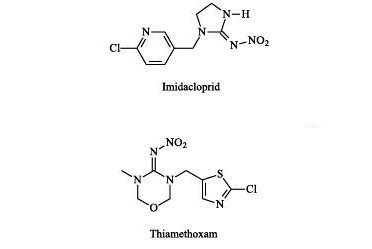Neonicotinoids (also termed neonics) comprise a class of insecticides and pesticides that chemically resemble nicotine. They are the most widely used insecticides in the world and are deployed by plant and crop farmers because these chemical formulations aggressively attack the nervous systems of insect pests. However, the use of these insecticides has been controversial. Chiefly, environmental organizations and agricultural researchers have determined that the actions of neonicotinoids are not limited to the harmful pests that are being targeted by farmers. Instead, many beneficial pollinating insects, as well as other animal species, are being harmed by exposure to various neonicotinoids. In particular, widespread population reductions have been noted among honeybees (Apis mellifera). Because of these environmental concerns, the European Union has instituted a complete ban (as of the end of 2018) on the outdoor use of three of the most prevalent neonicotinoids—clothianidin, imidacloprid, and thiamethoxam. See also: Agricultural chemistry; Beekeeping; Die-off of bees; Hymenoptera; Insecta; Insecticide; Nicotine alkaloids; Pesticide; Pollination; Population ecology

Neonicotinoids were developed and marketed in the 1990s as less-toxic alternatives to chemical insecticides that were deemed to be more dangerous to the environment and to other animal species. Thus, they became the predominant insecticide group and were applied on numerous economically important crops, including wheat, corn, oilseed rape (canola), soybeans, and sunflowers. However, long-term studies into the effects of neonicotinoids have identified unintended consequences. In addition to being a contributing factor to the declines observed in honeybee populations, neonicotinoids are causing reductions in the numbers of other nonpest insect species and of insect-eating bats and birds. Moreover, because neonicotinoids are also incorporated into soils and can be contained in runoff waters, the insecticides are being carried greater distances, thereby potentially affecting the environmental integrity and biodiversity of locations far removed from those involved with agricultural endeavors. Finally, neonicotinoids have been found in samples of honey taken from around the world, raising the possibility of a direct harmful effect on humans through consumption of foods that contain honey. See also: Agricultural science (animal); Agricultural science (plant); Agriculture; Environmental toxicology
The ban enacted by the European Union could be a first step of a full re-evaluation in the approval and use of neonicotinoids. Other countries, including Canada and the United States, are considering limits on the use of neonicotinoids and the conditions under which neonicotinoid insecticides may be applied. See also: Economic entomology





